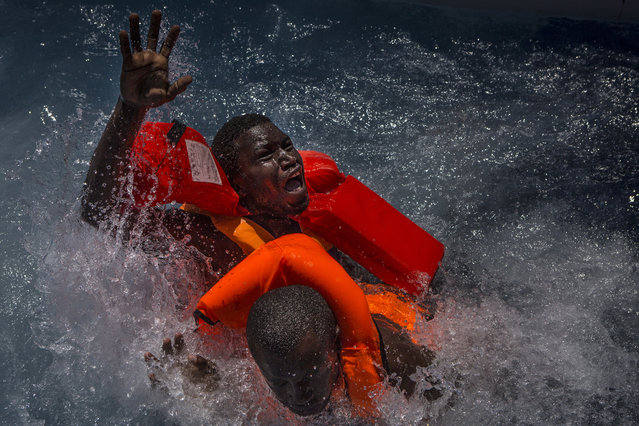
A handout photo made available by the World Press Photo (WPP) organization on 13 February 2017 shows a picture by British photographer Mathieu Willcocks that won the Spot News – Third Prize, Stories award of the 60th annual World Press Photo Contest, it was announced by the WPP Foundation in Amsterdam, The Netherlands on 13 February 2017. Caption: Two men panic and struggle in the water during their rescue. Their rubber boat was in distress and deflating quickly on one side, tipping many migrants in the water. They were quickly reached by rescue swimmers and brought to safety. (Photo by Mathieu Willcocks/EPA/World Press Photo)
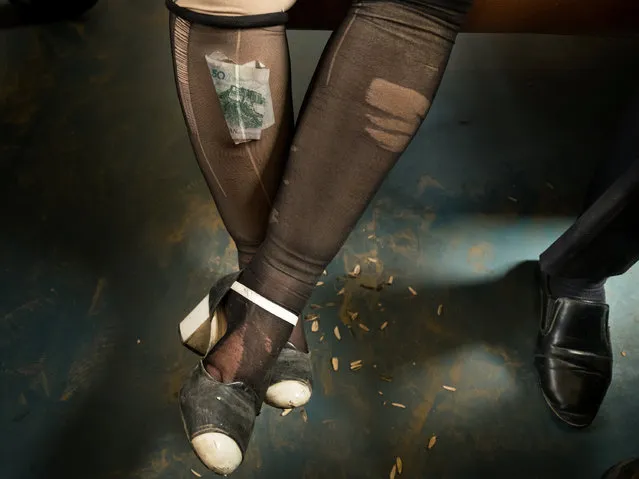
A handout image provided by the World Press Photo (WPP) organization on 13 February 2017 shows a picture by Matthieu Paley that won the Daily Life – Third Prize, Singles award of the 60th annual World Press Photo Contest, it was announced by the WPP Foundation in Amsterdam, The Netherlands on 13 February 2017. Caption: An Uyghur woman carries money in her stockings, a common practice. Uygur women, while Muslim, typically do not adhere to the conservative dress code that women in neighboring countries follow. On this train from Kashgar, you see a lesser known side of China. Most of the passengers are Uygur, a Chinese minority who live mostly in the west. One of the longest train journeys in the world—2,910 miles (4,683 kilometers) – runs across China from Hong Kong to Urumqi, made up of 18 wagons, traveling over 160 kilometers per hour, and taking over five hours to complete its journey. China is transformed with every mile, from verdant jungle and arid steppe to the Taklamakan desert, the second largest shifting-sand desert in the world in the Southern branch of the Silk Road, China. (Photo by Matthieu Paley/EPA/National Geographic/World Press Photo)
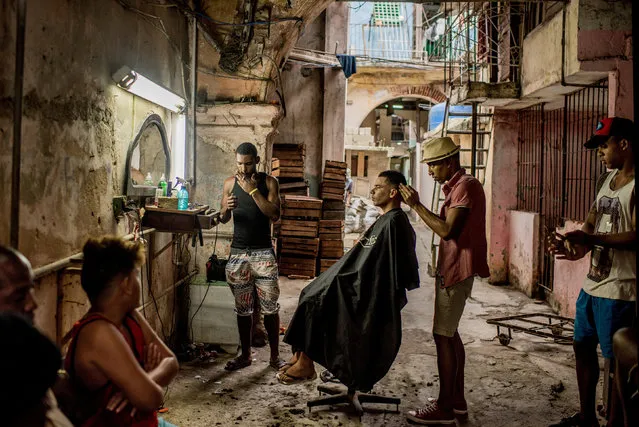
A handout photo made available by the World Press Photo (WPP) organization on 13 February 2017 shows a picture by The New York Times photographer Tomas Munita that won the Daily Life – First Prize, Stories award of the 60th annual World Press Photo Contest, it was announced by the WPP Foundation in Amsterdam, The Netherlands on 13 February 2017. Caption: A weathered barber shop in Old Havana, Cuba. Story: In December, days after Fidel Castro’s death, his ashes were taken into the countryside, on a route that retraced, in reverse, the steps of the revolution he led in 1959. Towns and villages along the route were emptied of residents as thousands tried to catch a glimpse of Castro’s remains. For many, the death of Fidel Castro felt like that of a father. In death, as in life, Fidel Castro demanded reverence. Cuba brims with life, a contrast drawn sharper amid its faded grandeur. From one end of the country to the other, thousands of Cubans waited to bid farewell to Fidel. (Photo by Tomás Munita/EPA/The New York Times/World Press Photo)
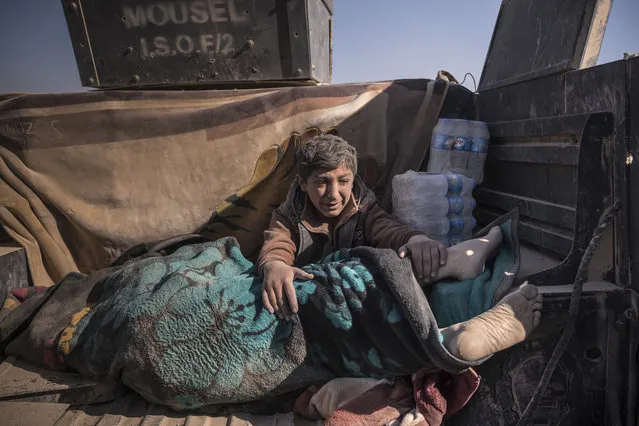
A handout photo made available by the World Press Photo (WPP) organization on 13 February 2017 shows a picture by The New York Times photographer Sergey Ponomarev that won the General News – Second Prize, Stories award of the 60th annual World Press Photo Contest, it was announced by the WPP Foundation in Amsterdam, The Netherlands on 13 February 2017. Caption: A boy holds the body of his father, killed by the Islamic State, as he arrived at a field hospital on the outskirts of Mosul, Iraq. Story: More than two years after the Islamic State first blitzed across Iraq in 2014, Iraqi security forces are scrambling to evict the militant group from Mosul, its last major stronghold in the country. The campaign has displaced nearly 70,000 Iraqis, and may uproot hundreds of thousands more. With an escalating number of civilians caught up in the battle, some military officials are second-guessing their initial strategy. (Photo by Sergey Ponomarev/EPA/The New York Times/World Press Photo)
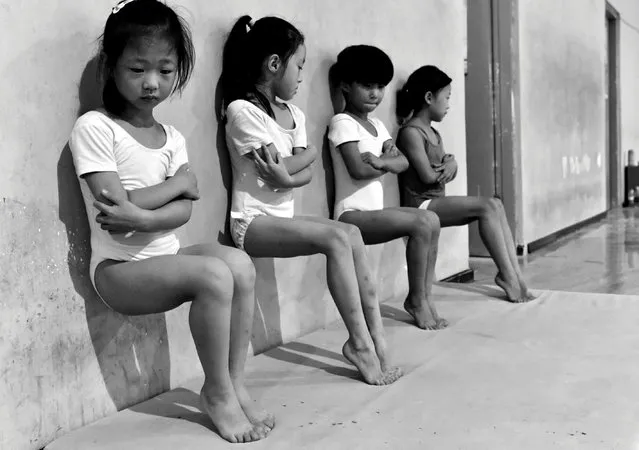
A handout image provided by the World Press Photo (WPP) organization on 13 February 2017 shows a picture by Tiejun Wang that won the Daily Life – Second Prize, Singles award of the 60th annual World Press Photo Contest, it was announced by the WPP Foundation in Amsterdam, The Netherlands on 13 February 2017. Caption: Four students of a gymnastics school in Xuzhou, China, do toe-pressure training for 30 minutes in the afternoon. (Photo by Tiejun Wang/EPA/World Press Photo)
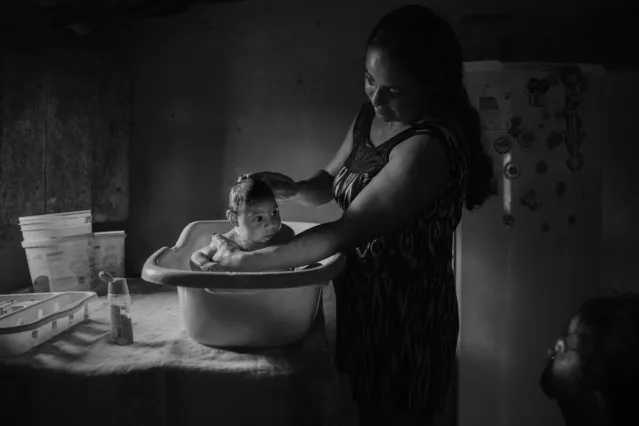
A handout photo made available by the World Press Photo (WPP) organization on 13 February 2017 shows a picture by Folha de Sao Paulo photographer Lalo de Almeida that won the Contemporary Issues – Second Prize, Stories award of the 60th annual World Press Photo Contest, it was announced by the WPP Foundation in Amsterdam, The Netherlands on 13 February 2017. Caption: Adriana Cordeiro Soares, 30, bathes her son João Miguel, 3 months old, who was born with microcephaly caused by the Zika virus, in her house in the rural area of Sao Vicente do Serido. Story: In September 2015, babies in Brazil began to be born with microcephaly and other malformations, and in April 2016 the link between the Zika virus and these malformations was confirmed. Northeastern Brazil, where most of the Zika cases of microcephaly were reported, is one of the poorest regions in the country, and lacks an adequate health system. Many children with microcephaly often live hundreds of kilometers away from the nearest health center and spend hours traveling in order to receive medical and physical therapy. Most come from poor households and receive little governmental support. (Photo by Lalo de Almeida/EPA/Folha de Sao Paulo/World Press Photo)

A handout photo made available by the World Press Photo (WPP) organization on 13 February 2017 shows a picture by The New York Times photographer Daniel Berehulak that won the General News – First Prize, Stories award of the 60th annual World Press Photo Contest, it was announced by the WPP Foundation in Amsterdam, The Netherlands on 13 February 2017. Caption: Heavy rain pours as police operatives investigate inside an alley where a victim, Romeo Joel Torres Fontanilla (37) was killed by two unidentified gunmen riding motorcycles in the early morning in Manila, Philippines. Story: President Rodrigo Duterte of the Philippines began his anti-drug campaign when he took office on 30 June 2016. Since then, more than 2,000 people have been slain at the hands of the police alone. Beyond those killed in official drug operations, the Philippine National Police have counted more than 3,500 unsolved homicides since 1 July. The victims, suspected users and pushers, are not afforded any semblance of due process. (Photo by Daniel Berehulak/EPA/The New York Times/World Press Photo)
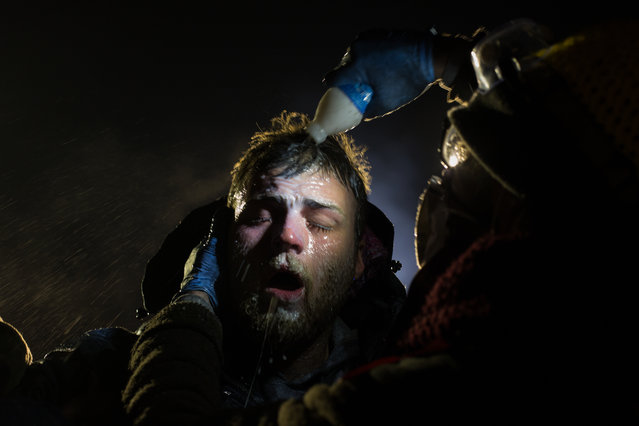
A handout photo made available by the World Press Photo (WPP) organization on 13 February 2017 shows a picture by Canadian photographer Amber Bracken that won the Contemporary Issues – First Prize, Stories award of the 60th annual World Press Photo Contest, it was announced by the WPP Foundation in Amsterdam, The Netherlands on 13 February 2017. Caption: A man is treated with milk of magnesia after being pepper sprayed by police at the blockade on highway 1806. White people have joined the camps in large numbers, often standing in front of indigenous protestors to shield them with their bodies. Story: For nearly 10 months, members of the Standing Rock Sioux tribe and their allies camped out in opposition to the Dakota Access Pipeline crossing their territory and threatening their water supply. The estimated 3.78 billion US dollar project, backed by Energy Transfer Partners, is nearly complete, covering almost 1,172 miles. In military vehicles and body armor, police used tear gas, pepper spray, rubber bullets, and water cannons against the protesters, and have been accused of inhumane treatment of arrestees. (Photo by Amber Bracken/EPA/World Press Photo)
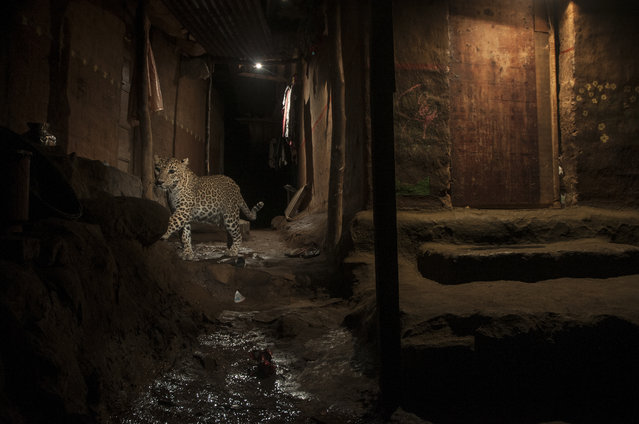
A handout image provided by the World Press Photo (WPP) organization on 13 February 2017 shows a picture by Nayan Khanolkar that won the Nature – Second Prize, Singles award of the 60th annual World Press Photo Contest, it was announced by the WPP Foundation in Amsterdam, The Netherlands on 13 February 2017. Caption: A wild leopard strolls through Sanjay Gandhi National Park, a protected area in the northern part of Mumbai city, India, on 24 September 2016. The leopard is on its nocturnal prowl in the adjacent human settlements in search of food, which in these areas is typically dogs or pigs. (Photo by Nayan Khanolkar/EPA/World Press Photo)
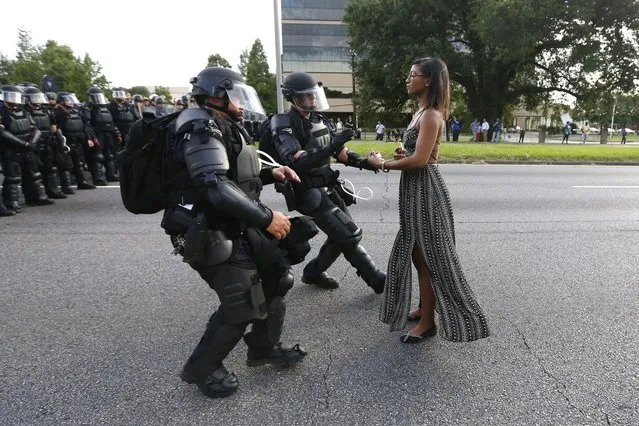
A handout photo made available by the World Press Photo (WPP) organization on 13 February 2017 shows a picture by Thomson Reuters photographer Jonathan Bachman that won the Contemporary Issues – First Prize, Singles award of the 60th annual World Press Photo Contest, it was announced by the WPP Foundation in Amsterdam, The Netherlands on 13 February 2017. Caption: Lone activist Ieshia Evans stands her ground while offering her hands for arrest as she is charged by riot police during a protest against police brutality outside the Baton Rouge Police Department in Louisiana, USA, on 09 July 2016. Evans, a 28-year-old Pennsylvania nurse and mother of one, traveled to Baton Rouge to protest against the shooting of Alton Sterling. Sterling was a 37-year-old black man and father of five, who was shot at close range by two white police officers. The shooting, captured on a multitude of cell phone videos, aggravated the unrest coursing through the United States in previous years over the use of excessive force by police, particularly against black men. (Photo by Jonathan Bachman/Thomson Reuters/World Press Photo)
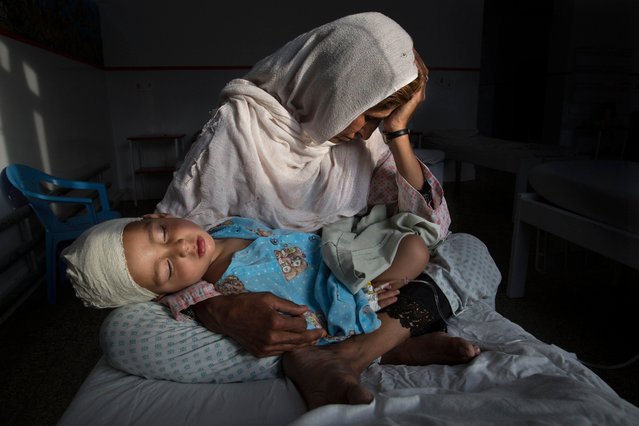
A handout image provided by the World Press Photo (WPP) organization on 13 February 2017 shows a picture by Time Lightbox photographer Paula Bronstein that won the Daily Life – First Prize, Singles award of the 60th annual World Press Photo Contest, it was announced by the WPP Foundation in Amsterdam, The Netherlands on 13 February 2017. Caption: At the hospital, Najiba holds her two-year-old nephew Shabir who was injured from a bomb blast in Kabul on 29 March 2016. Afghanistan has endured armed conflict since 1979, when the Soviet Union invaded. Afghan civilians are at greater risk today than at any time since Taliban rule, which ended in 2001. According to UN statistics, in the first half of 2016 at least 1,600 people died, and more than 3,500 people were injured. Despite billions of dollars spent by the international community to stabilize the country, Afghanistan has seen little improvement in terms of overall stability and human security. (Photo by Paula Bronstein/EPA/World Press Photo)
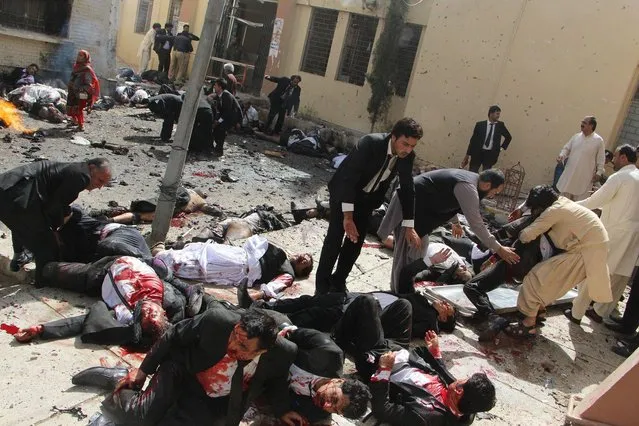
A handout image provided by the World Press Photo (WPP) organization on 13 February 2017 shows a picture by Jamal Taraqai of the european pressphoto agency (epa) that won the Spot News – First Prize, Singles award of the 60th annual World Press Photo Contest, it was announced by the WPP Foundation in Amsterdam, The Netherlands on 13 February 2017. Caption: Lawyers help their injured colleagues after a bomb explosion in Quetta, Pakistan, on 8 August 2016. Seventy people were killed when a bomb exploded outside a civil hospital where a crowd of lawyers and journalists had gathered to mourn Bilal Anwar Kasi, a senior lawyer who had been assassinated hours earlier. (Photo by Jamal Taraqai/EPA/World Press Photo)
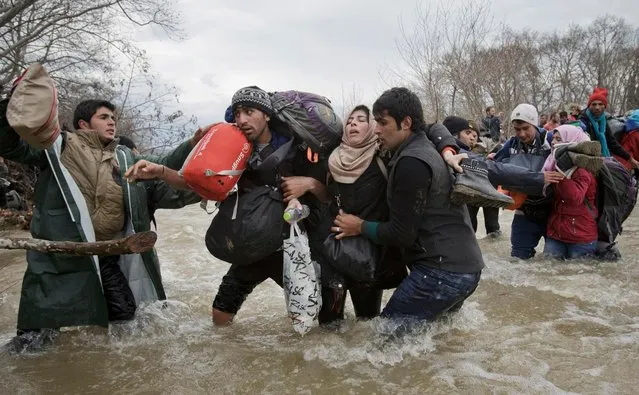
A handout photo made available by the World Press Photo (WPP) organization on 13 February 2017 shows a picture by The Associated Press photographer Vadim Ghirda that won the Contemporary Issues – Second Prize, Singles award of the 60th annual World Press Photo Contest, it was announced by the WPP Foundation in Amsterdam, The Netherlands on 13 February 2017. Caption: A woman is supported by two men while crossing a river, as refugees attempt to reach Macedonia on a route that would bypass the border fence, on 14 March 2016. Hundreds of refugees walked out of an overcrowded camp on the Greek-Macedonian border on this day, shortly after the closure of Macedonia's borders, determined to head north despite the dangers of the crossing. (Photo by Vadim Ghirda/EPA/World Press Photo)
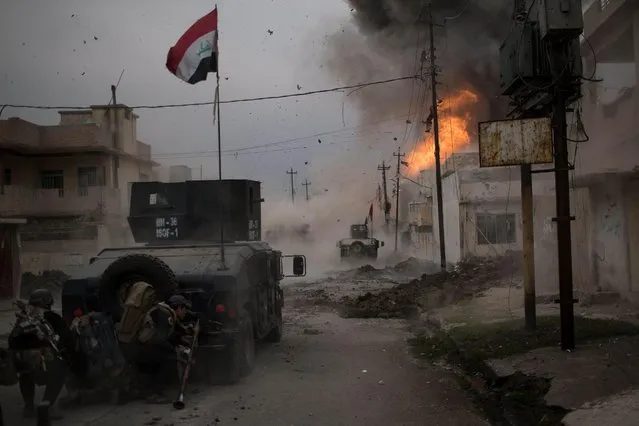
A handout image provided by the World Press Photo (WPP) organization on 13 February 2017 shows a picture by Felipe Dana that won the Spot News – Third Prize, Singles award of the 60th annual World Press Photo Contest, it was announced by the WPP Foundation in Amsterdam, The Netherlands on 13 February 2017. Caption: A car bomb explodes next to Iraqi special forces armored vehicles as they advance towards Islamic State-held territory in Mosul, Iraq, on 16 November 2016. The Iraqi Special Operations Forces, also known as the Golden Division, is the Iraqi unit that leads the fight against the Islamic State with the support of the airstrikes of the Coalition Forces. They were the first forces to enter the Islamic State-held city of Mosul in November 2016. (Photo by Felipe Dana/EPA/AP Photo/World Press Photo)
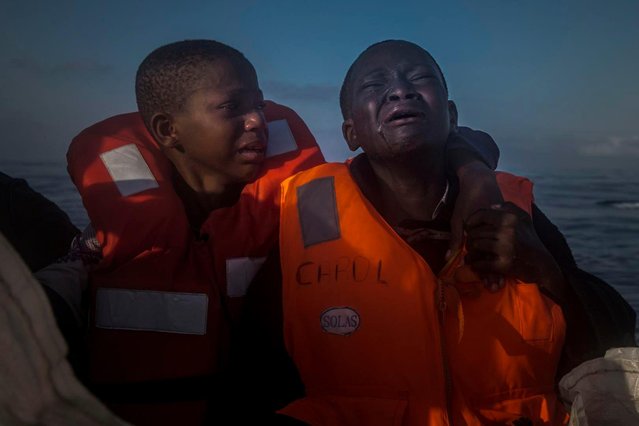
A handout image provided by the World Press Photo (WPP) organization on 13 February 2017 shows a picture by Santi Palacios that won the General News – Second Prize, Singles award of the 60th annual World Press Photo Contest, it was announced by the WPP Foundation in Amsterdam, The Netherlands on 13 February 2017. Caption: An 11-year-old girl from Nigeria (left), who said her mother died in Libya, cries next to her 10-year-old brother aboard an NGO rescue boat, on 28 July 2016. The children had sailed for hours in an overcrowded rubber boat with other refugees during a rescue operation on the Mediterranean Sea, about 23 kilometers north of Sabratha, Libya. Libyan smugglers often take advantage of refugees, charging anywhere from $750 to $3500 for a place on typically dangerous boats they say are heading to Italy. (Photo by Santi Palacios/EPA/World Press Photo)
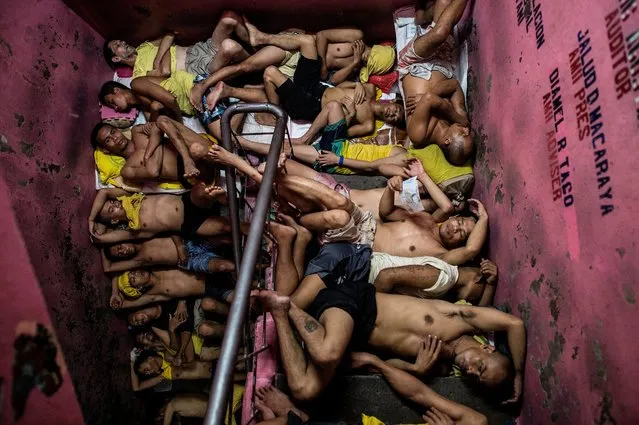
A handout image provided by the World Press Photo (WPP) organization on 13 February 2017 shows a picture by Noel Celis that won the General News – Third Prize, Singles award of the 60th annual World Press Photo Contest, it was announced by the WPP Foundation in Amsterdam, The Netherlands on 13 February 2017. Caption: The photos show scenes from Quezon City Jail, one of the Philippines' most overcrowded prisons. Conditions are getting worse as police wage an unprecedented war on crime. There are 3,800 inmates at the jail, which was built six decades ago to house 800, and they engage in a relentless contest for space. Men take turns to sleep on the cracked cement floor of an open-air basketball court, the steps of staircases, underneath beds and hammocks made out of old blankets. (Photo by Noel Celis/AP Photo/World Press Photo)
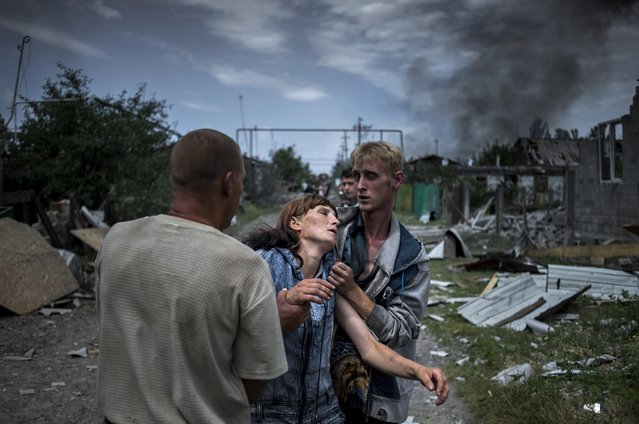
A handout photo made available by the World Press Photo (WPP) organization on 13 February 2017 shows a picture by Rossiya Segodnya photographer Valery Melnikov that won the Long-Term Projects – First Prize award of the 60th annual World Press Photo Contest, it was announced by the WPP Foundation in Amsterdam, The Netherlands on 13 February 2017. Caption: Citizens in the village of Luhanskaya after the air attack. Story: Ordinary people became victims of the conflict between self-proclaimed republics and the official Ukrainian authorities from 2014 onwards in the region of Donbass. Disaster came into their lives unexpectedly. These people were involved in the military confrontation against their will. They experienced the most terrible things: the death of their friends and relatives, destroyed homes and the ruined lives of thousands of people. (Photo by Valery Melnikov/EPA/Rossiya Segodnya/World Press Photo)
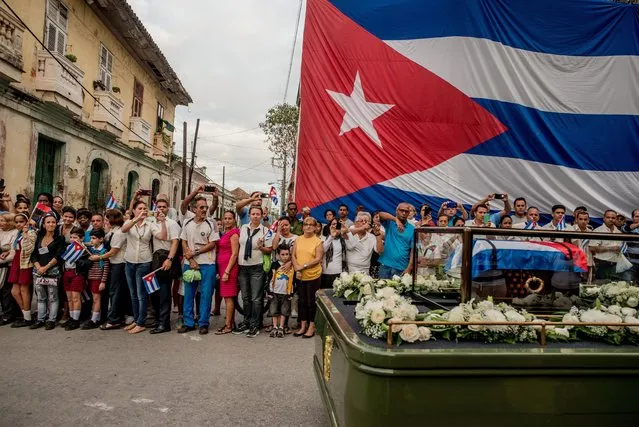
A handout photo made available by the World Press Photo (WPP) organization on 13 February 2017 shows a picture by The New York Times photographer Tomas Munita that won the Daily Life – First Prize, Stories award of the 60th annual World Press Photo Contest, it was announced by the WPP Foundation in Amsterdam, The Netherlands on 13 February 2017. Caption: Fidel Castro's funeral procession in Santa Clara, Cuba. Cuba declared nine days of mourning after Fidel Castro’s death, a period that culminated with his funeral. Story: In December, days after Fidel Castro’s death, his ashes were taken into the countryside, on a route that retraced, in reverse, the steps of the revolution he led in 1959. Towns and villages along the route were emptied of residents as thousands tried to catch a glimpse of Castro’s remains. For many, the death of Fidel Castro felt like that of a father. In death, as in life, Fidel Castro demanded reverence. Cuba brims with life, a contrast drawn sharper amid its faded grandeur. From one end of the country to the other, thousands of Cubans waited to bid farewell to Fidel. (Photo by Tomas Munita/EPA/The New York Times/World Press Photo)
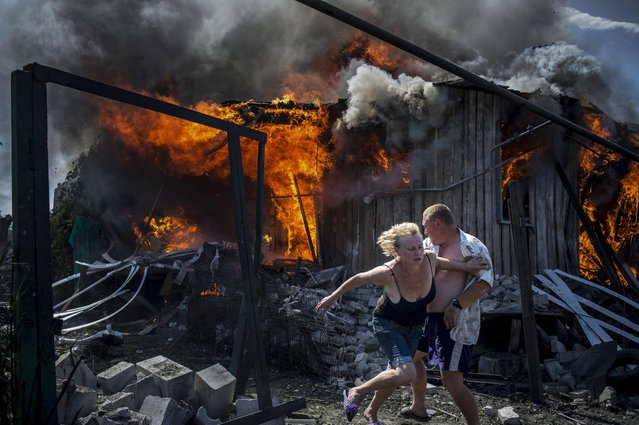
A handout photo made available by the World Press Photo (WPP) organization on 13 February 2017 shows a picture by Rossiya Segodnya photographer Valery Melnikov that won the Long-Term Projects – First Prize award of the 60th annual World Press Photo Contest, it was announced by the WPP Foundation in Amsterdam, The Netherlands on 13 February 2017. Caption: Civilians escape from a fire at a house destroyed by an air attack in the Luhanskaya village. Story: Ordinary people became victims of the conflict between self-proclaimed republics and the official Ukrainian authorities from 2014 onwards in the region of Donbass. Disaster came into their lives unexpectedly. These people were involved in the military confrontation against their will. They experienced the most terrible things: the death of their friends and relatives, destroyed homes and the ruined lives of thousands of people. (Photo by Valery Melnikov/EPA/Rossiya Segodnya/World Press Photo)
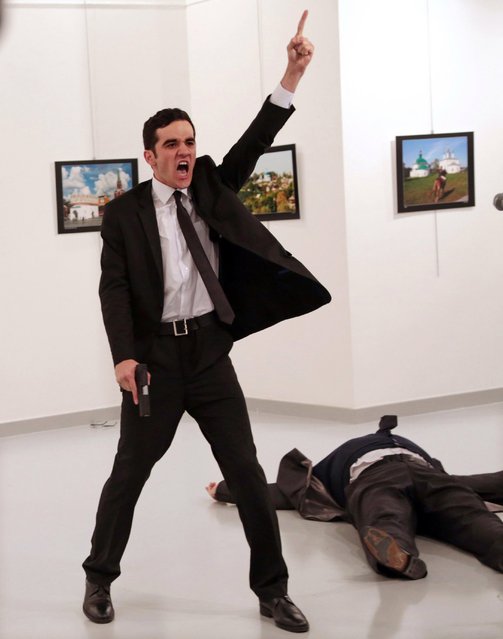
A handout photo made available by the World Press Photo (WPP) organization on 13 February 2017 shows a picture by The Associated Press photographer Burhan Ozbilici that won the Spot News – First Prize, Stories award of the 60th annual World Press Photo Contest, it was announced by the WPP Foundation in Amsterdam, The Netherlands on 13 February 2017. Caption: Mevlut Mert Altintas shouts after shooting Andrey Karlov, the Russian ambassador to Turkey, at an art gallery in Ankara, Turkey. Story: Mevlut Mert Altintas, a 22-year-old off-duty police officer, assassinated the Russian ambassador to Turkey, Andrey Karlov, at an art exhibition in Ankara, Turkey, on 19 December 2016. He wounded three other people before being killed by officers in a shootout. (Photo by Burhan Ozbilici/AP Photo/World Press Photo)
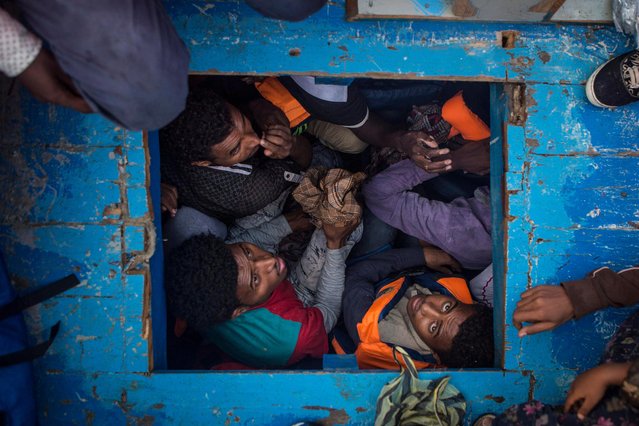
A handout photo made available by the World Press Photo (WPP) organization on 13 February 2017 shows a picture by British photographer Mathieu Willcocks that won the Spot News – Third Prize, Stories award of the 60th annual World Press Photo Contest, it was announced by the WPP Foundation in Amsterdam, The Netherlands on 13 February 2017. Caption: Eritrean migrants seen cramped in the hold of a large wooden boat which carried approximately 540 men, women, and children. Story: The central Mediterranean migration route, between the coasts of Libya and Italy, remains busy. According to reports by the UNHCR, 5,000 people died while attempting to cross the Mediterranean in 2016. NGOs and charities such as Migrant Offshore Aid Station (MOAS) continue their efforts to patrol the patch of sea north of the Libyan coast, in the hope of rescuing refugees before the potential of drowning. The rescue team on board the MOAS' Responder are there to mitigate loss of life at sea. Operating like a sea-born ambulance, they rush to assist and rescue refugee vessels in distress, provide medical assistance, and bring the refugees safely to Italy. (Photo by Mathieu Willcocks/EPA/World Press Photo)
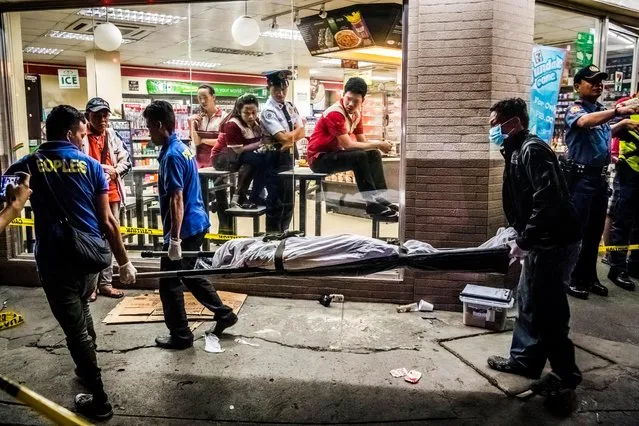
A handout photo made available by the World Press Photo (WPP) organization on 13 February 2017 shows a picture by The New York Times photographer Daniel Berehulak that won the General News – First Prize, Stories award of the 60th annual World Press Photo Contest, it was announced by the WPP Foundation in Amsterdam, The Netherlands on 13 February 2017. Caption: Funeral parlor workers carry away the body of Edwin Mendoza Alon-Alon (36) who was killed by an unknown gunman on the road in front of a 7-Eleven store in Manila, Philippines. Story: President Rodrigo Duterte of the Philippines began his anti-drug campaign when he took office on 30 June 2016. Since then, more than 2,000 people have been slain at the hands of the police alone. Beyond those killed inofficial drug operations, the Philippine National Police have counted more than 3,500 unsolved homicides since 1 July. The victims, suspected users and pushers, are not afforded any semblance of due process. (Photo by Daniel Berehulak/EPA/World Press Photo)
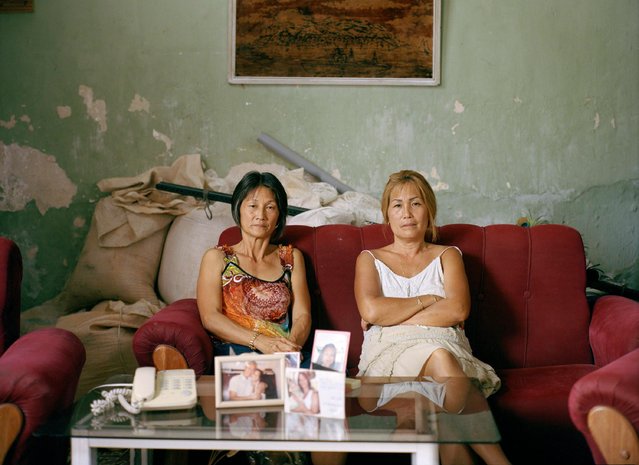
A handout photo made available by the World Press Photo (WPP) organization on 13 February 2017 shows a picture by US photographer Michael Vince Kim that won the People – First Prize, Stories award of the 60th annual World Press Photo Contest, it was announced by the WPP Foundation in Amsterdam, The Netherlands on 13 February 2017. Caption: Sisters Olga and Adelina Lim Hi, one of the few Korean descendants who do not have mixed heritage.Their grandfather was Im Cheon Taek, one of the leading figures of the earliest Korean community in Cuba. Story: Taken from stories told by the descendants of Korean henequen workers in Mexico and Cuba, this project aims to provide a poetic account of their memories. In 1905, more than 1,000 Koreans traveled to Mexico under the false promise of prosperity in a paradisiac land. Instead, they arrived at henequen plantations. They were sold off as indentured slaves to harvest agave that was then known as “the green gold” of Mexico. Individuals were beaten if they fell behind their daily quota, and forced to work long hours under the scorching sun and the suffocating humidity of Yucatan. (Photo by Michael Vince Kim/EPA/World Press Photo)
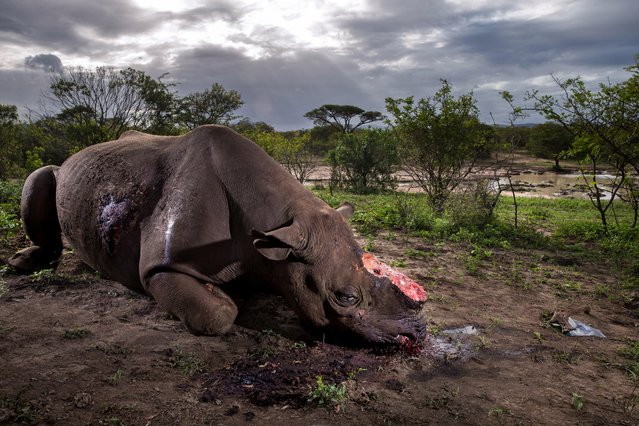
A handout photo made available by the World Press Photo (WPP) organization on 13 February 2017 shows a picture by Getty Images for National Geographic Magazine photographer Brent Stirton that won the Nature – First Prize, Stories award of the 60th annual World Press Photo Contest, it was announced by the WPP Foundation in Amsterdam, The Netherlands on 13 February 2017. Caption: A black rhino bull is seen dead, poached for its horns less than 8 hours earlier at Hluhluwe Umfolozi Game Reserve, South Africa. It is suspected that the killers came from a local community approximately 5 kilometers away, entering the park illegally, shooting the rhino at a water hole with a high-powered, silenced hunting rifle. An autopsy and postmortem carried out by members of the KZN Ezemvelo ranger team later revealed that the large caliber bullet went straight through this rhino, causing massive tissue damage. It was noted that he did not die immediately, but ran a short distance, fell to his knees and a coup de grâce shot was administered to the head from close range. Story: Inside Kruger National Park, the largest rhinoceros reserve in the world, along the border of Mozambique and South Africa, there exists a battle between poachers and small NGOs trying to protect this rare species. After crossing the border into Mozambique, the life expectancy for a rhinoceros is 24 hours. It is an environmental crisis, caused by Asia's upper class hunger for the horn, which is worth more than gold. The horn is part of an ancient Asian medical system and today is seen as a cure for everything from cancer to kidney stones. Essentially keratin, a mild alkaline substance identical to fingernails, the horn is ground down and then ingested by the sick and the wealthy of Vietnam and China, The imbiber hopes for a miracle cure, but science has shown that it has a placebo. (Photo by Brent Stirton/Getty Images for National Geographic Magazine/World Press Photo)
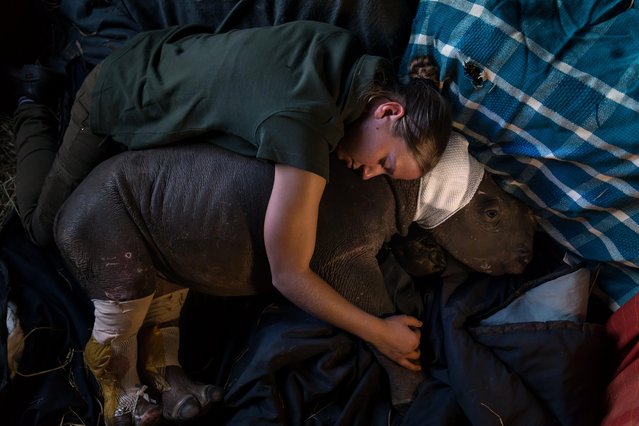
A handout photo made available by the World Press Photo (WPP) organization on 13 February 2017 shows a picture by Getty Images for National Geographic Magazine photographer Brent Stirton that won the Nature – First Prize, Stories award of the 60th annual World Press Photo Contest, it was announced by the WPP Foundation in Amsterdam, The Netherlands on 13 February 2017. Caption: Care For Wild Africa is a donor-run organization that specializes in caring for wounded animals. They have a special focus on rhino and have taken in many rhino orphans from the poaching wars across South Africa at this time. Their latest orphan is Lulah, her mother was killed in Kruger National Park and when the rangers found her she was estimated to be one month old. Hyenas had attacked the tiny calf and chewed off her ears and parts of her nose, as well as a big bite off of her rear right leg. Lulah has a strong will to live and, despite fighting off infection in the wound, she is looking like she will survive. Lulah has a full-time caregiver, Dorota Ladosz, who is full-time staff. Dorota has an honors degree in both Animal Science and Wildlife Management. She lives full-time with Lulah at the time of this picture and sleeps with her in her enclosure. She maintains a constant watch on Lulah’s injuries and her temperature and feeds her at regular intervals. Lulah received surgery on this day and her wounds were cleaned out by Jan-Louis Ras, a surgeon who volunteers his services to Care for Wild Africa but actually usually works on humans. Infections in Lulah’s leg were cleaned out and her ears and the top of her head were dressed and disinfected. Care for Wild Africa has taken care of multiple rhino calves like this and today they have 27 survivors living on the property. Paying for their upkeep and their security is difficult. (Photo by Brent Stirton/Getty Images for National Geographic Magazine/World Press Photo)
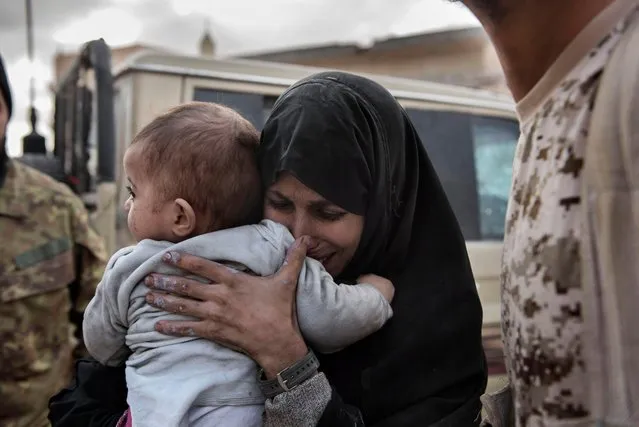
A handout photo made available by the World Press Photo (WPP) organization on 13 February 2017 shows a picture by Italian photographer Alessio Romenzi that won the General News – Third Prize, Stories award of the 60th annual World Press Photo Contest, it was announced by the WPP Foundation in Amsterdam, The Netherlands on 13 February 2017. Caption: A woman and a child, allegedly Islamic State family members, are seen after fighters of the Libyan forces affiliated to the Tripoli government took them out of the fighting area in Al Jiza neighborhood. Story: Sirte, Libya, is one of the three self-proclaimed capitals of the so-called Islamic State, along with Raqqa in Syria and Mosul in Iraq. It was the first of the three to fall, with an offensive launched by the Libyan government in May 2016. It took seven months of fighting, 500 American airstrikes, the lives of 700 Libyan soldiers and more than 3,000 injured Libyan soldiers to finally declare the city free. (Photo by Alessio Romenzi/EPA/World Press Photo)
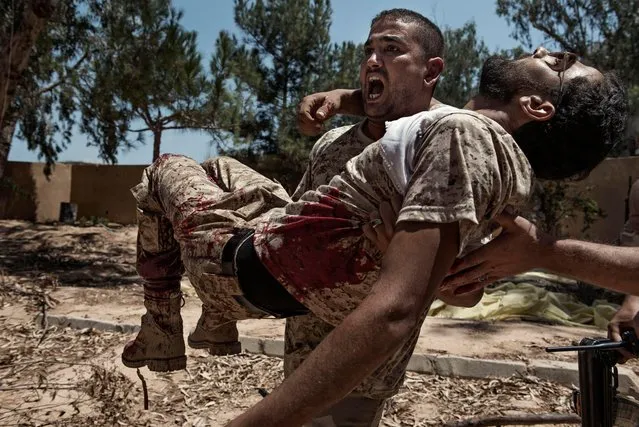
A handout photo made available by the World Press Photo (WPP) organization on 13 February 2017 shows a picture by Italian photographer Alessio Romenzi that won the General News – Third Prize, Stories award of the 60th annual World Press Photo Contest, it was announced by the WPP Foundation in Amsterdam, The Netherlands on 13 February 2017. Caption: A fighter of the Libyan forces affiliated to the Tripoli government carries a comrade who was seriously injured just seconds before by a booby trap placed by Islamic State fighters. Story: Sirte, Libya, is one of the three self-proclaimed capitals of the so-called Islamic State, along with Raqqa in Syria and Mosul in Iraq. It was the first of the three to fall, with an offensive launched by the Libyan government in May 2016. It took seven months of fighting, 500 American airstrikes, the lives of 700 Libyan soldiers and more than 3,000 injured Libyan soldiers to finally declare the city free. (Photo by Alessio Romenzi/EPA/World Press Photo)
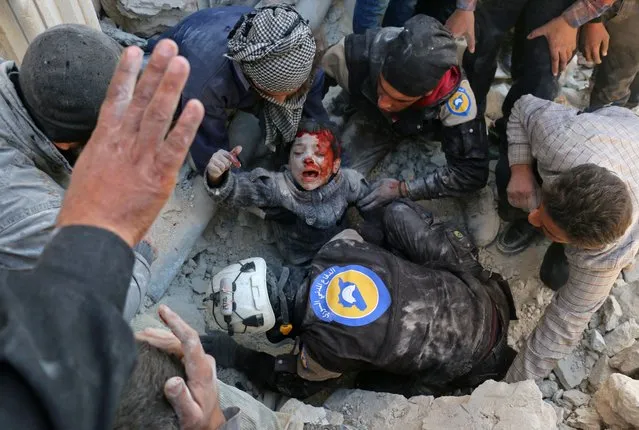
A handout photo made available by the World Press Photo (WPP) organization on 13 February 2017 shows a picture by Agence France-Presse photographer Ameer Alhalbi that won the Spot News – Second Prize, Stories award of the 60th annual World Press Photo Contest, it was announced by the WPP Foundation in Amsterdam, The Netherlands on 13 February 2017. Caption: Syrian civil defence volunteers, known as the White Helmets, rescue a boy from the rubble following a reported barrel bomb attack on the Bab al-Nairab neighborhood of Aleppo on 24 November 2016. Story: Since 2012, Syria's northern city of Aleppo has been divided between rebel and regime-held districts, but a devastating regime offensive launched in mid-October saw the rebels ousted from their iconic former stronghold. The army's victory in Aleppo was marked by heavy shelling which destroyed all established hospitals in the area and much of the city was reduced to a wasteland by air and artillery attacks. (Photo by Ameer Alhalbi/AFP Photo/World Press Photo)
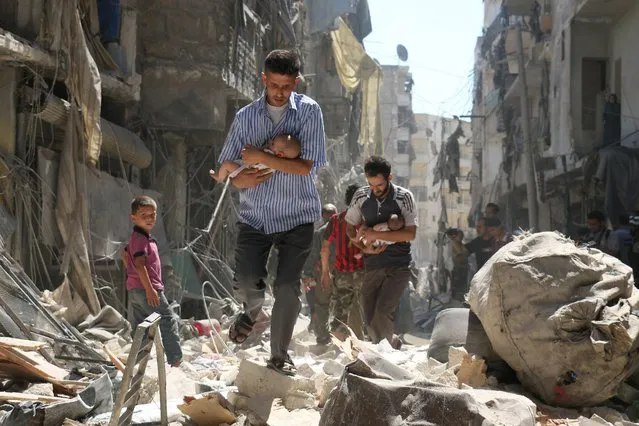
A handout photo made available by the World Press Photo (WPP) organization on 13 February 2017 shows a picture by Agence France-Presse photographer Ameer Alhalbi that won the Spot News – Second Prize, Stories award of the 60th annual World Press Photo Contest, it was announced by the WPP Foundation in Amsterdam, The Netherlands on 13 February 2017. Caption: Syrian men carrying babies make their way through the rubble of destroyed buildings following a reported airstrike on the rebel-held Salihin neighborhood of Aleppo on 11 September 2016. Airstrikes have killed dozens in rebel-held parts of Syria as the opposition considers whether to join a US-Russia truce deal due to take effect on 12 September. Story: Since 2012, Syria's northern city of Aleppo has been divided between rebel and regime-held districts, but a devastating regime offensive launched in mid-October saw the rebels ousted from their iconic former stronghold. The army's victory in Aleppo was marked by heavy shelling which destroyed all established hospitals in the area and much of the city was reduced to a wasteland by air and artillery attacks. (Photo by Ameer Alhalbi/AFP Photo/World Press Photo)
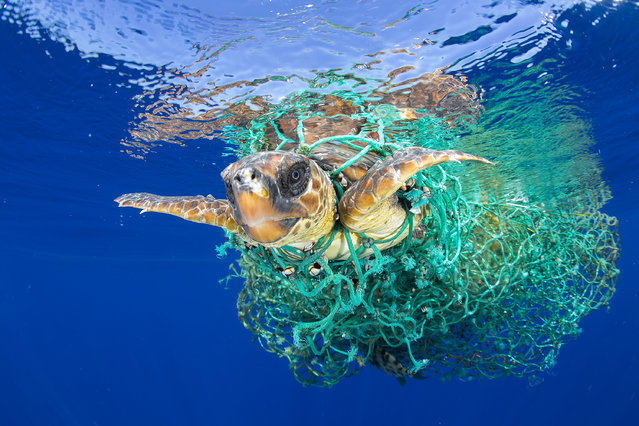
A handout photo made available by the World Press Photo (WPP) organization on 13 February 2017 shows a picture by Spanish photographer Francis Perez that won the Nature – First Prize, Singles award of the 60th annual World Press Photo Contest, it was announced by the WPP Foundation in Amsterdam, The Netherlands on 13 February 2017. Caption: A sea turtle entangled in a fishing net swims off the coast of Tenerife, Canary Islands, Spain, on 8 June 2016. Sea turtles are considered a vulnerable species by the International Union for Conservation of Nature. Unattended fishing gear is responsible for many sea turtle deaths. (Photo by Francis Perez/EPA/World Press Photo)
15 Feb 2017 00:06:00,
post received
0 comments
